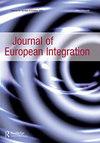Stalled by design: New paradoxes in the European Union’s single financial market
IF 2.2
1区 社会学
Q1 INTERNATIONAL RELATIONS
引用次数: 3
Abstract
ABSTRACT Since the US financial meltdown in 2008 that sparked a Eurozone crisis, the European Union has introduced new financial market initiatives that were intended to advance integration, bring stability, and create shared prosperity for EU members. Innovations included Banking Union, Capital Markets Union, and the European Fund for Strategic Investments. We find, however, that tensions between supranationalization and retaining national control in institutional design diminished incentives for full participation, particularly among the EU’s East Central European members. Uneven levels of foreign bank ownership between East and West Europe, disparities in the depth of capital markets, and varying institutional capacity have often led Eastern member states to opt out. Paradoxically, initiatives intended to advance integration and overcome developmental inequalities have instead compounded national fragmentation and restricted pathways to catching up for some of the EU’s less prosperous members. Thus, European financial integration was stalled by design.故意停滞:欧盟单一金融市场的新悖论
摘要自2008年美国金融危机引发欧元区危机以来,欧盟推出了新的金融市场举措,旨在促进一体化,带来稳定,并为欧盟成员国创造共同繁荣。创新包括银行联盟、资本市场联盟和欧洲战略投资基金。然而,我们发现,超国有化和在制度设计中保持国家控制之间的紧张关系削弱了充分参与的动机,尤其是在欧盟的中东欧成员国中。东欧和西欧之间外国银行所有权水平的不均衡、资本市场深度的差异以及不同的机构能力往往导致东欧成员国选择退出。矛盾的是,旨在促进一体化和克服发展不平等的举措反而加剧了国家分裂,并限制了追赶一些不太繁荣的欧盟成员国的途径。因此,欧洲金融一体化在设计上陷入停滞。
本文章由计算机程序翻译,如有差异,请以英文原文为准。
求助全文
约1分钟内获得全文
求助全文

 求助内容:
求助内容: 应助结果提醒方式:
应助结果提醒方式:


